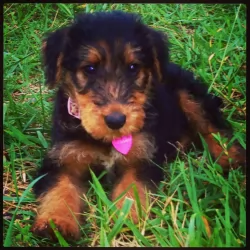 MyDogBreeds
MyDogBreeds Chesapeake Bay Retriever is originated from United States but Airedale Terrier is originated from United Kingdom. Both Chesapeake Bay Retriever and Airedale Terrier are having almost same height. Chesapeake Bay Retriever may weigh 16 kg / 36 pounds more than Airedale Terrier. Both Chesapeake Bay Retriever and Airedale Terrier has almost same life span. Both Chesapeake Bay Retriever and Airedale Terrier has almost same litter size. Chesapeake Bay Retriever requires Low maintenance. But Airedale Terrier requires High maintenance
Chesapeake Bay Retriever is originated from United States but Airedale Terrier is originated from United Kingdom. Both Chesapeake Bay Retriever and Airedale Terrier are having almost same height. Chesapeake Bay Retriever may weigh 16 kg / 36 pounds more than Airedale Terrier. Both Chesapeake Bay Retriever and Airedale Terrier has almost same life span. Both Chesapeake Bay Retriever and Airedale Terrier has almost same litter size. Chesapeake Bay Retriever requires Low maintenance. But Airedale Terrier requires High maintenance
 Fondly referred to as the Chessie, the ‘Labrador-look-alike’ Chesapeake Bay Retriever’s history extends to St. Johns Newfoundland pups which were rescued off a ship off the coast of Maryland in 1807. The Chesapeake is an American breed.
Fondly referred to as the Chessie, the ‘Labrador-look-alike’ Chesapeake Bay Retriever’s history extends to St. Johns Newfoundland pups which were rescued off a ship off the coast of Maryland in 1807. The Chesapeake is an American breed.
It is believed that the Newfoundland puppies as they grew, were bred with area dogs, with there being few records of the early dogs, but it is believed that spaniels and dogs were included.
In 1918 the Chesapeake Bay Retriever was recognized by the American Kennel Club and in 1964 the dog was declared the official dog of Maryland.
 Airedale terrier got its name from a small river Aire in Leeds area in Great Britain. First information about Airedale terrier originates back in 1850. This breed was used as otter hunters. Airedale terrier was invented by mixing Otterhound, old English terrier, and a white bull-terrier. Airedale was used primarily for hunting otters, deer, or wild boars. Not just that, Airedale was a very good guard dog. During the war, this breed was used for delivery and it showed a lot of courage. One Airedale terrier even received a medal for its bravery in World War I. Today it is used as an official dog of National Police of Britain.
Airedale terrier got its name from a small river Aire in Leeds area in Great Britain. First information about Airedale terrier originates back in 1850. This breed was used as otter hunters. Airedale terrier was invented by mixing Otterhound, old English terrier, and a white bull-terrier. Airedale was used primarily for hunting otters, deer, or wild boars. Not just that, Airedale was a very good guard dog. During the war, this breed was used for delivery and it showed a lot of courage. One Airedale terrier even received a medal for its bravery in World War I. Today it is used as an official dog of National Police of Britain.
 The Chesapeake is a large dog belonging to the Sporting breed group. Perhaps one of the more distinctive features of the Chesapeake Bay Retriever is the yellowish eyes.
The Chesapeake is a large dog belonging to the Sporting breed group. Perhaps one of the more distinctive features of the Chesapeake Bay Retriever is the yellowish eyes.
This is a strong, well muscled dog that stands anywhere from 61 – 66cm and weighs between 30 – 45kg. The short, thick coat of the dog is waterproof and comes in colors ranging from brown to reddish yellow to chestnut shades.
The head of the Chesapeake is broad and roundish with medium length floppy ears. The tail is long. The toes are webbed which helps makes the dog an excellent swimmer as well.
The Chesapeake Bay Retriever is a happy kind of dog with a bright, alert, intelligent expression. He loves water and is guaranteed to make a wonderful pet for any family.
With his wonderful characteristics, it is worth training him and socializing him as this training sets parameters for him so that he becomes a wonderfully obedient dog that gets on well with other pets in the home as well as with children.
 Average height of Airedale terrier is approximately 56-61cm, while their average weight is 20-29kg. Females are slightly smaller than male dogs.
A lifespan of an Airedale terrier variates and depends on the health of the dog but the average lifespan of this breed is 10-12.
Litter Size of the Airedale terrier is approximately 8-9 puppies.
Other Names Waterside Terrier, Bingley Terrier, King of Terriers
Average height of Airedale terrier is approximately 56-61cm, while their average weight is 20-29kg. Females are slightly smaller than male dogs.
A lifespan of an Airedale terrier variates and depends on the health of the dog but the average lifespan of this breed is 10-12.
Litter Size of the Airedale terrier is approximately 8-9 puppies.
Other Names Waterside Terrier, Bingley Terrier, King of Terriers
 The Chesapeake Bay Retriever is ready to be your best friend and companion. This dog breed is highly active and he’ll fit easily into a family that is active and can ensure he is involved in all their activities.
The Chesapeake Bay Retriever is ready to be your best friend and companion. This dog breed is highly active and he’ll fit easily into a family that is active and can ensure he is involved in all their activities.
The beauty about the Chesapeake Bay Retriever is that he is generally an even tempered dog, and once trained and socialized, becomes a truly splendid pet, one that will be loving and loyal with his owners.
 Airedale terrier is an amazing and playful dog. They are very intelligent, hard-working, and athletic dogs. This breed has a lot of energy and stamina, so regular activity is a must for this breed. They are independent thinkers which can be challenging sometimes, but overall, if they have enough activity they are amazing and goofy pets.
Airedale terrier is an amazing and playful dog. They are very intelligent, hard-working, and athletic dogs. This breed has a lot of energy and stamina, so regular activity is a must for this breed. They are independent thinkers which can be challenging sometimes, but overall, if they have enough activity they are amazing and goofy pets.
It is not recommendable to leave your dog for a long period of time because it will get bored, and when it’s bored, they tend to become destructive. You don’t want to see destroyed home when you come back from work.
Airedale terrier is great watchdog too. They will protect family if it is necessary, but overall they are very friendly. They are very sensitive and gentle with kids. Also, with a proper socialization of the dog, they are very friendly towards another animal too.
Basically, the temperament of your Airedale terrier depends on training, socialization, and genes. If you properly train your dog, with good socialization you won’t be having any problems.
 By taking good care of your Chesapeake, you can ensure his teeth remain strong, his nose is wet and his coat glossy and healthy. He is a robust breed as it is, but there are always some common dog diseases to watch out for -
By taking good care of your Chesapeake, you can ensure his teeth remain strong, his nose is wet and his coat glossy and healthy. He is a robust breed as it is, but there are always some common dog diseases to watch out for -
Obesity is an ailment that is afflicting many humans and their pets. Being overweight can bring on a host of unwanted diseases. Obesity is a serious disease that can contribute to digestive disorders, back pain, heart disease and joint problems.
Instead of showering him with little treats to show him how much you love him, rather stroke him or play a game with him – it’s the ultimate treat for him – your attention.
Remember that if you aren’t going to let your Chessie become a parent, the best thing you can do for your male or female is to have them spayed or neutered. In fact, spaying or neutering can decrease the likelihood of your pet getting certain types of cancers as well as other illnesses. Speak to your vet and discover how these procedures can be very beneficial for your pet.
 Airedale terrier is generally a very healthy dog, but as almost any breed, they can have some health issues. Hip dysplasia, cancer, and allergies can cause problems with this breed. You have to be very careful when choosing a perfect dog for you. Examine the family tree to avoid the possible genetic flaws.
Airedale terrier is generally a very healthy dog, but as almost any breed, they can have some health issues. Hip dysplasia, cancer, and allergies can cause problems with this breed. You have to be very careful when choosing a perfect dog for you. Examine the family tree to avoid the possible genetic flaws.
Airedale terrier will be a healthy dog if you take a proper care, and with regular vet checks, there shouldn’t be any problems.
 The Chesapeake Bay Retriever sheds fairly heavily throughout the year. The coat should be brushed at least twice a week to remove dead hair. Brushing is good for the dog too as it distributes the oils of the skin, making his coat shinier.
The Chesapeake Bay Retriever sheds fairly heavily throughout the year. The coat should be brushed at least twice a week to remove dead hair. Brushing is good for the dog too as it distributes the oils of the skin, making his coat shinier.
Because the Chesapeake has floppy ears, the ears will need to be checked on a weekly basis for signs of infection. This is of particular importance if your Chessie loves to spend time splashing around in water. The veterinarian can recommend and also advise on cleaners for your dog’s ears.
An excellent diet and plenty of exercise will ensure your Chessie can live to be 11, 12 or 13 years of age. You want to keep his diet of kibble, rice, vegetables and meat consistent so as not to upset his stomach.
Avoid giving him foods such as chocolates. Do research on the harm you can do to your pet when you feed him some human foods that are entirely not meant for a dog’s digestive system.
The Chesapeake Bay Retriever has always loved to be active - hunting for- and retrieving birds from rivers and lakes. He is used to being active and will require a good supply of exercise. Take him for long walks and let him join you on your runs or your cycling.
 Airedale feeding depends on how much daily activity has. Overall, for an average Airedale 1.5-2.5 cups of high-quality dry food, divided into a 2 meals is recommendable. It is better than leaving the whole food out all the time. Then again, if your dog is not very active or active more than an average dog, feeding should be organized for your dog’s needs.
Airedale feeding depends on how much daily activity has. Overall, for an average Airedale 1.5-2.5 cups of high-quality dry food, divided into a 2 meals is recommendable. It is better than leaving the whole food out all the time. Then again, if your dog is not very active or active more than an average dog, feeding should be organized for your dog’s needs.
Airedale puppies should eat more than an adult dog. 3-5 meals per day are an optimal measure. Puppies need more meals per day for better development. Also, giving your puppy minerals and vitamins would improve overall health when it is fully grown dog.
Airedale has a very interesting coat. The coat has two layers, topcoat which is strong, and undercoat which is soft. They do not shed a lot, but twice a year they shed more than the rest of the time. It is not very hard to groom Airedale terrier. Brushing is recommended once or twice a week. You can also bath your Airedale but not very often. Airedale doesn’t require trimming, but some owners decide to do that. It is up to you if you want to trim your dog.